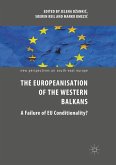This book applies insights into the nature and impact of hope from medical studies and political philosophy to contemporary international politics. It shows how the promotion of hope was central to the rise of the West, focusing on the case of statebuilding in Kosovo - widely regarded as one of the most iconic Western initiatives in the unipolar era. The book explores the effects of hope on both the internationals charged with governing Kosovo and local residents, and how two related pathologies of hope - "wilful" and "wishful" - have aligned to slow Kosovo's progress since 1999.
The author argues that Kosovo's current plight is indicative of both the West's decline and the dark side of hope, vividly illustrating the perils of "bad hope". Yet the book explains why "dashed hope" need not lead to despair or violence, and why local initiatives in Kosovo demonstrate groups' and individuals' agency in forging progressive movements based on the principles and strategies of "good hope".
The author argues that Kosovo's current plight is indicative of both the West's decline and the dark side of hope, vividly illustrating the perils of "bad hope". Yet the book explains why "dashed hope" need not lead to despair or violence, and why local initiatives in Kosovo demonstrate groups' and individuals' agency in forging progressive movements based on the principles and strategies of "good hope".








